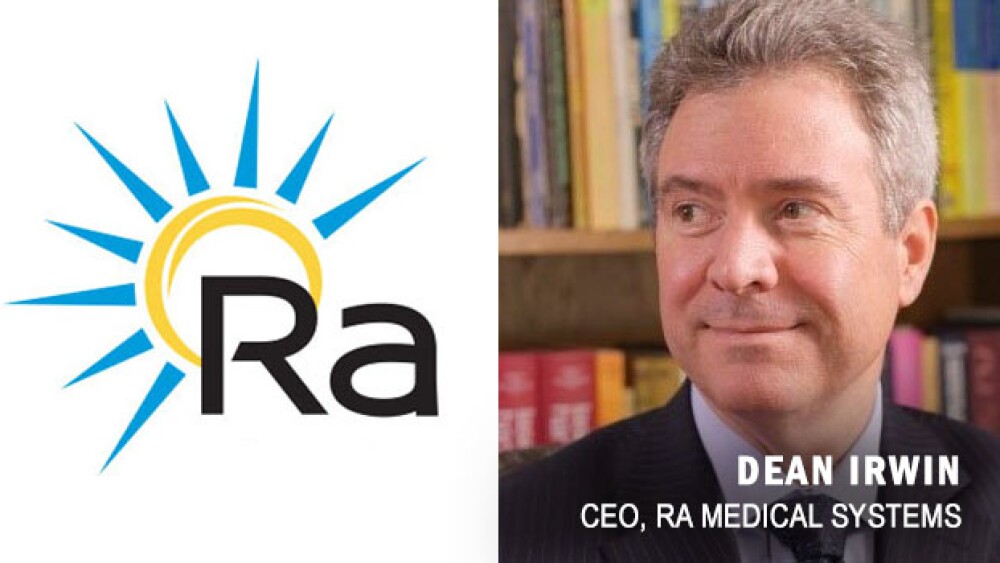Ra Medical only has five full-time salespeople on staff, but expects that to grow to 20 to 25 people later this year.
Carlsbad, Calif.-based RA Medical Systems closed out 2017 with the launch of its newly approved peripheral artery disease (PAD) treatment.
Ra’s DABRA (Destruction of Arteriosclerotic Blockages by laser Radiation Ablation) system became available to customers in October after receiving a May approval from the U.S. Food and Drug Administration. The company currently has its system in dozens of sites across the country and catheter reorders are coming into the company, Ra Medical Chief Executive Officer Dean Irwin said from the J.P. Morgan Healthcare Conference last week. Those reorders are signs that the product is successfully taking care of patient needs, he said.
In an exclusive interview, Irwin told BioSpace that he anticipates the use of the DABRA system to continue to grow exponentially throughout the year and be in more than 200 clinics by the end of 2018. The system is also now available in several European countries, including Italy, Germany, Belgium and the United Kingdom, and Irwin expects to see continued growth there as well.
“People see how safe and effective this system is,” Irwin said.
In fact, Irwin said he is hearing anecdotal evidence that many physicians are returning rival devices in favor of the DABRA system. He said doctors are eagerly using catheters on patients without prompting from onsite sales associates – a sales practice he said is quite common when it comes to medical device companies.
The DABRA system uses lasers to break up blockages in arteries in PAD patients. There are approximately 8.5 million Americans diagnosed with PAD, a life-threatening condition in which the arteries that carry blood from the heart to the legs and arms narrow and become blocked. PAD is one of the leading causes of amputation. In the U.S. and Europe, PAD is responsible for 240,000 amputations every year. Nearly one-quarter of these patients die within 30 days and almost half within a year of their amputation, according to data provided by Ra Medical.
Ra Medical only has five full-time salespeople on staff, but Irwin said he expects that to grow to 20 to 25 people later this year. He said the additional staff is needed as the sales and reorder rate is meeting the expectations of Ra’s leadership team.
Not only is the DABRA system effective, Irwin said it provides cost savings to users.
“We believe this is the go-to modality,” he said.
Those were messages he took to J.P. Morgan and Biotech Showcase, a program that coincided with the healthcare conference. Irwin said the DABRA program was well received by investors and clinicians.
Buoyed by the positive reception at J.P. Morgan and Biotech Showcase, as well as the evidence coming from product users, Irwin said the next two years appear to be good ones for the company.
“We are anticipating launch in China and Japan and expect to migrate into larger healthcare facilities such as hospitals and major treatment centers,” Irwin said.
In addition to expanding its global use, Irwin said Ra will be pushing for regulatory approval of other indications for the DABRA system and will look to roll out additional products, such as balloons used in vascular treatment.
He said the company is bringing on three or four new people each month as the company grows and expects Ra Medical will employ about 100 people by the end of 2018. The company currently employs about 70 people. At the start of 2017 the company had about 40 full-time employees, Irwin said.
“We’re keeping our nose to the grindstone. We’re working on sales growth and ensuring access to the system. We’re also making sure our manufacturing is clean and that our salespeople are out there with the positive message,” Irwin said. “We’re executing according to the plan and will move along at the best speed we can accommodate.”





